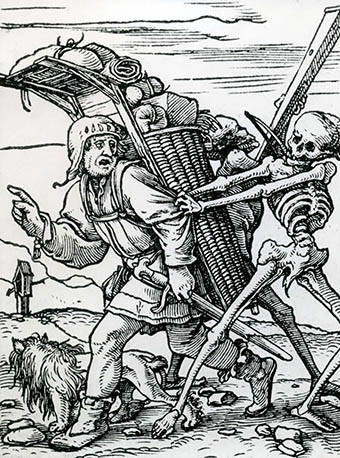
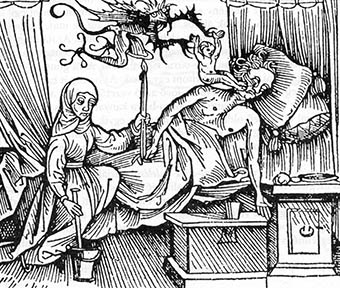
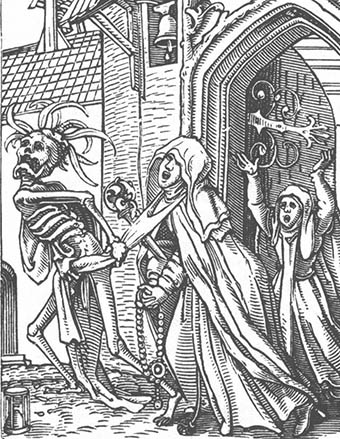
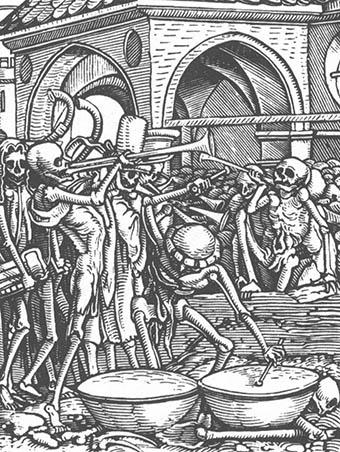
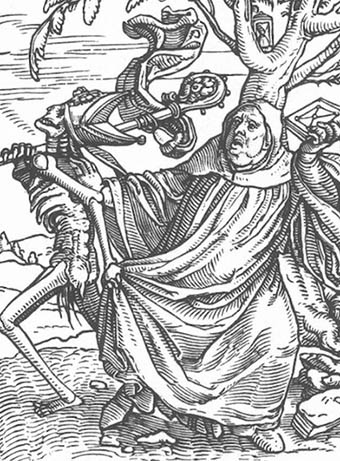
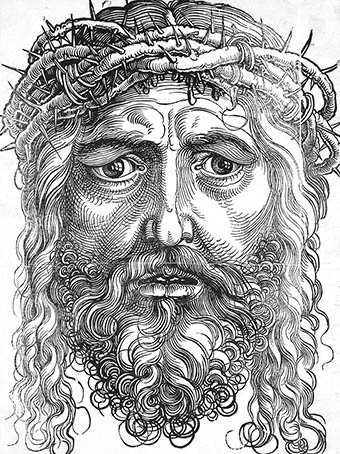
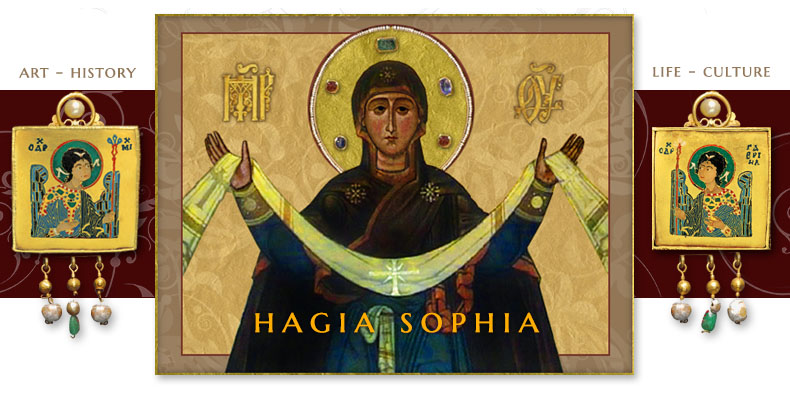
Blck Death In Constantinople - 543-544 - an Eyewitness Account
John of Ephesus describes the Justinianic plague
When thus the scourge weighed heavy upon this city, first it eagerly began (to assault) the class of the poor, who lay in the streets. It happened that 5000 and 7000, or even 12,000 and as many as 16,000 of them departed (this world) in a single day. Since thus far it was (only) the beginning, men were standing by the harbours, at the crossroads and at the gates counting (the dead). Thus having perished they were shrouded with great diligence and buried; they departed (this life) being clothed and followed (to the grave) by everybody.
Thus the (people of Constantinople) reached the point of disappearing, only few remaining, whereas (of) those only who had died on the streets — if anybody wants us to name their number, for in fact they were counted — over 300,000 were taken off the streets. Those who counted, having reached (the number of) 230,000 and seeing that (the dead) were innumerable, gave up (reckoning) and from then on (the corpses) were brought out without being counted.
When those for whom the enshrouders and grave-diggers were (too) few had been removed and (put) in a large common grave, He stretched His destructive hand over the rulers of the world and the renowned in the realm of earthly men, the mighty in riches and those resplendent in their power. From now on the common people, together with the nobles could be seen to be smitten by a single great and harsh blow, and suddenly to fall, apart from a few. Not only those who died, but also those who escaped sudden death (were struck) with this plague of swellings in their groins, with this disease which they call bouboes, and which in our Syriac language is translated as ‘tumours’. Both servants and masters were smitten together, nobles and common people impartially. They were struck down one opposite another, groaning.
As to God’s sentence, it was explained (as being decreed) so that the people should be astonished and remain in amazement about His righteous judgements which cannot be understood, nor comprehended, by human beings, as it is written, “Thy judgements are like the great deep”.
Also we saw that this great plague showed its effect on animals as well, not only on the domesticated but also on the wild, and even on the reptiles of the earth. One could see cattle, dogs and other animals, even rats, with swollen tumours, struck down and dying. Likewise wild animals could be found smitten by the same sentence, struck down and dying.
This terrible sign came upon the people of this city suddenly after removal of the poor.
Another sign would separate those to be snatched away from those who would survive and remain (waiting) for either death or life. It appeared in this way: three signs became visible in the middle of the palm of a man’s hand in the form of black pocks which did not depart (from the skin) but (remained) deep (in it). They were like three drops of blood deep within. On whomsoever these appeared, the moment they did so the end would come within just one or two hours, or it might happen that (the person) had one day’s delay. These (signs) were (to be found) on many (people).
To others however, neither this (happened) nor that, but as they were looking at each other and talking, they (began to) totter and fell either in the streets or at home, in harbours, on ships, in churches and everywhere. It might happen that (a person) was sitting at work on his craft, holding his tools in his hands and working, and he would totter to the side and his soul would escape. It might happen that (people) came to the bath to bathe as usual and they would not be able to take off their clothes, but would fall and expire. It might happen that (a person) went out to market to buy necessities and while he was standing and talking or counting his change suddenly the end would overcome the buyer here and the seller there, the merchandise remaining in the middle together with the payment for it, without there being either buyer or seller to pick it up.
And in all ways everything was brought to nought, was destroyed and turned into sorrow alone and funeral lamentations: everyone’s hands were weakened, buying and selling ceased and the shops with all their worldly riches beyond description and moneylenders’ large shops (closed). The entire city then came to a standstill as if it had perished, so that its food supply stopped. There was nobody to stand and do his job, with the result that food vanished from the markets and great tribulation ensued, especially for the people prostrate with exhaustion from illnesses. Only a few were strong (enough) to bring to any bazaar anything worth one obol, but if they wished they took a dinar for it. Thus everything ceased and stopped.
What was most pressing of all was simply that everybody who was still alive should remove corpses from his house, and that also other (corpses) should disappear from the streets by being removed to the seashore. There boats were filled with them and during each sailing they were thrown overboard and the ships returned to take other (corpses).
It would be seemly for the hearer of these things to shed tears for us rather than for the dead and to lament with sighs for what our eyes saw. Alas, my brothers, for this cruel sight! Alas for those corpses (worthy of) lamentations at that time!
Standing on the seashore one could see litters colliding with each other and coming back to carry and to throw upon the earth two or three (corpses), to go back again and to bring (further corpses). Others carried (the corpses) on boards and carrying poles, bringing and piling (them) up one upon another. For other (corpses), since they had rotted and putrefied, matting was sewn together. People bore them on carrying poles and coming (to the shore) threw them (down), with pus running out of them. And they would return bringing (corpses) again. Others who were standing on the seashore dragged them and threw them down upon boats, piling them up in heaps of two or three and (even) of five thousand (each). Innumerable (corpses) piled up on the entire seashore, like flotsam on great rivers, and the pus flowed, discharging itself down into the sea.
With what tears should I have wept at that time, O my beloved, when I stood observing those heaps, full of unspeakable horror and terror? What sighs would have sufficed me, what funeral laments? What heart-break, what lamentations, what hymns and dirges would suffice for the suffering of that time over the people thrown in great heaps torn open one upon another with their bellies putrefying and their intestines flowing like brooks down into the sea? How too could the heart of a person who saw these things, with which nothing could be compared, fail to rot within him, and the rest of his limbs fail to dissolve together with him (though still) alive, from pain, bitter wailing and sad funeral laments, having seen white hair of the old people who had rushed all their days after the vanity of the world and had been anxious for gathering (means) and waiting for a magnificent and honourable funeral (to be prepared) by their heirs, who (now were) struck down upon the earth, (this) white hair (now) being grievously defiled with the pus of their heirs.
(With what tears should I have wept) for beautiful young girls and virgins who awaited a joyful bridal feast and preciously adorned (wedding) garments, (but were now) lying stripped naked, and defiled with the filth of other dead, making a miserable and bitter sight, not even inside a grave, but in the streets and harbours, their corpses having been dragged (there) like those of dogs;
—(for) lovable babies being thrown in disorder, while those who were casting them onto boats seized and hurled them from a distance with great horror;
—(for) handsome and merry young men (now) turned gloomy, (who were) cast upside down one under another (in a) terrifying (manner);
—(for) noble and chaste women, dignified with honour, who sat in bedchambers, (now with) their mouths swollen, wide open and gaping, (who) were piled up in horrible heaps, all ages lying prostrate, all statures bowed down and overthrown, all ranks pressed one upon another, in a single wine-press of (God’s) wrath, like beasts, not like human beings.
And what shall we say about (all) them (if not) to call out upon (God’s) mercy with the words, “Right are Thy judgements, O Lord! Thou didst not wish that these things should befall Thy creation but through the abundance of iniquity and through our erring from Thy commandments and Thy wish, Thou hast delivered us (to the cataclysm)”.
And again in our same clamour we shall speak about and say together with the prophet, “O Lord, in Thy wrath remember Thy mercies”. “Have pity for Thy name’s sake, O Lord, over Thy people and renounce not Thy inheritance.”
Thus when the bearers became few, the whole city, (once) rich in inhabitants, splendid with power, and opulent, suddenly became a gloomy and putrid tomb for its inhabitants, so that now also the graves were insufficient. And this was more painful than anything, for the (corpses) from the city collected together in tribulation were cast down on boats (and having been transported) from this side across (the bay), were thrown there like dung on the earth and nobody would gather (them).
Also “the empire was sitting in sorrow”, as it is written, for (the authorities) learned that the hands of the people who were bringing out the corpses grew weak because they also became fewer and (began to) disappear. The city stank with corpses as there were neither litters nor diggers and the corpses were heaped up in the streets.
Thus when the merciful emperor, in whose days these things took place, learned of it, he stirred himself up with zeal and showed diligence, giving orders for 600 litters to be produced. He appointed a man, his referendarius, whose name was Theodore, who was also zealous in good deeds, and gave him instructions to take and spend as much gold as should be necessary for supervising these matters and for encouraging people with great gifts not to be negligent but to dig large ditches and to fill them by piling up the corpses. This man proceeded with application. He crossed (the bay) northward to the other shore called Sykai and climbed the mountain which was above the city. He took along many people, gave them much gold and had very large pits dug, in every one of which 70, 000 (corpses) were put. He placed there (some) men who brought down and turned over (corpses), piled them up and pressed the layers one upon another as a man might heap up hay in a stack. Also he placed by the pits men holding gold and encouraging the workmen and the common people with gifts to carry and to bring up (corpses), giving five, six and even seven and ten dinars for each load. So also he walked around in the city urging (people) to bring out (the corpses). He himself was ordered to fill every grave he could find, to whomsoever it might belong. Thus by his application the city was gradually rid of the corpses. Everyone who had many corpses (to be buried) went to inform him and he would have them removed.
When this man was walking around in the city, a deacon from our (people) appeared who also was very zealous in these matters. (The referendarius) became aware of him and took him up and now appointed him in charge of the matter of the gifts and (general) custody together with himself.
When they went about they came and found a house all closed up and stinking, while people trembled at its smell. They entered and found in it about twenty people dead and rotten, with worms creeping all over them. Although terror seized them, they brought people, who having received large payments, picked them up in cloaks and removed them bearing them on carrying poles.
Others were found all dead but with babies alive and crying; other women were dead in their beds but the babies, their children, were alive sleeping beside them, holding and sucking their breasts although (the mothers) were dead.
In (some) palaces life expired totally, in others, one remained out of a hundred (nobles), each of whom had been attended by many servants, but (now) had remained alone, or perhaps with few (servants only). But sometimes neither he nor any of his people (remained). Also those who (once) had been served by a multitude of servants, (now) stood and served themselves and the diseased in their homes.
The (imperial) palace was overwhelmed and overcome by sorrow. The emperor and the empress to whom myriads and thousands of commanders and the whole great senate had bowed and paid honour every day, (now) were miserable, and like everybody sank into grief, being served only by few.
(We omit) the rest of these matters which cannot be reported by people at all, (which took place) when devastation and destruction befell this (city), coming upon innumerable people of all kinds, upon many times as many as anywhere else, including the great city of Alexandria. Only now the hearts of people were numb and therefore there was no more weeping or funeral laments, but people were stunned as if giddy with wine. They were smitten in their hearts and had become numb.
What however was painful was that corpses should be dragged out and thrown down, people dealing with other people — with (their) dead — as with dead beasts: they dragged and threw, dazed and upset, (fulfilling) thus what was called in the Scripture “the burial of an ass”. It befell everybody here. From now on, as in Alexandria, nobody would go out of doors without a tag (upon which his name was) written and which hung on his neck or his arm.



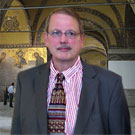
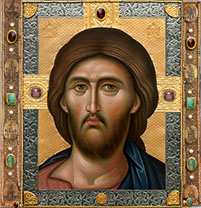 click here for icons of christ
click here for icons of christ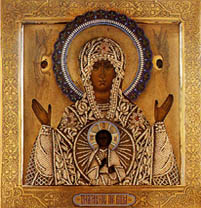 click here for icons of the theotokos
click here for icons of the theotokos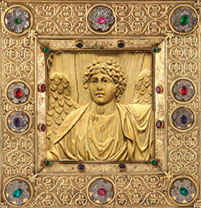 click here for icons of angels
click here for icons of angels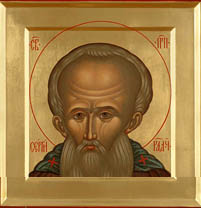 click here for icons of saints
click here for icons of saints








